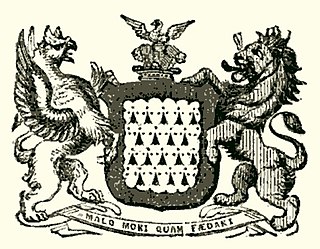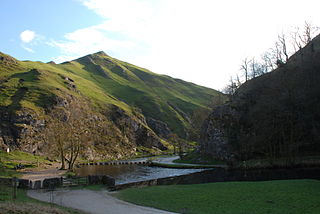Related Research Articles

Rowland FitzEustace, 1st Baron Portlester was an Irish peer, statesman and judge. He was one of the dominant political figures in late fifteenth-century Ireland, rivalled in influence probably only by his son-in-law Garret FitzGerald, the "Great" Earl of Kildare.
Sir Gerald Aylmer was an Irish judge in the time of Henry VIII, who played a key part in enforcing the Dissolution of the Monasteries. His numerous descendants included the Barons Aylmer.

John Barnewall, 3rd Baron Trimleston, was an Irish nobleman, judge and politician. He was the eldest son of Christopher Barnewall, 2nd Baron Trimlestown and his wife Elizabeth Plunket, daughter of Sir Thomas Fitz-Christopher Plunket of Rathmore, Lord Chief Justice of the King's Bench in Ireland and his second wife Marian Cruise. He succeeded his father as 3rd Baron in about 1513. His father, like most of the Anglo-Irish aristocracy, had supported the claim of the pretender Lambert Simnel to the English throne in 1487. After the failure of Simnel's rebellion, he received a royal pardon.
Nicholas St Lawrence, 4th Baron Howth was a leading Irish nobleman, soldier and statesman of the early Tudor period, who held the office of Lord Chancellor of Ireland.
James Bathe (c.1500–1570) was an Irish judge of the Tudor era, who was notable for serving as Chief Baron of the Irish Exchequer for thirty years under four successive monarchs. He was the grandfather of the 1st Earl of Roscommon, and of the noted musicologist William Bathe.
Richard Delahide was an Irish judge of the sixteenth century, who held the offices of Chief Justice of the Irish Common Pleas and Chief Baron of the Irish Exchequer. His career was seriously damaged by the Rebellion of Silken Thomas, in which several members of his family played a leading part, and he was fortunate to escape permanent disgrace.
Patrick Bermingham (c.1460–1532) was an Irish judge and statesman of the Tudor period who held the offices of Lord Chief Justice of Ireland and Chancellor of the Exchequer of Ireland. He was a firm supporter of English rule in Ireland and enjoyed the confidence of Henry VIII, who regarded him as a mainstay of the Irish administration.
Henry Burnell was an Irish judge and politician; he served briefly as Recorder of Dublin and as a justice of the Court of King's Bench. Though he was willing to accept Crown office, he spent much of his career in opposition to the Government. He was one of the leaders of the protest against the policies of the Lord Deputy of Ireland Sir Henry Sidney in the late 1570s, and as a member of the Irish House of Commons in the 1580s he successfully opposed Sidney's successor, Sir John Perrot. In the early 1600s, he was one of the leaders of the protest against strict enforcement of the Penal Laws. His professional reputation was gravely damaged in his later years by a verdict that he was guilty of forgery, when he was convicted and fined for having altered a deed concerning the inheritance of the 11th Earl of Kildare's estate. He was the grandfather of the playwright Henry Burnell.
Philip Bermingham (c.1420–1490) was an Irish judge who held the office of Lord Chief Justice of Ireland. He was regarded as "the most learned Irish lawyer of his time", but he had a somewhat turbulent political career and was twice accused of treason.
Sir William Darcy (c.1460–1540) was a leading Anglo-Irish statesman of the Pale in the early sixteenth century; for many years he held the office of Vice-Treasurer of Ireland. He wrote an influential treatise, The Decay of Ireland, which led to his being called "the father of the movement for political reformation in Ireland". He was a colourful and flamboyant character, whose exceptional height gave rise to his nickname "Great Darcy".
Oliver FitzEustace was an Irish judge. His appointment as Chief Baron of the Irish Exchequer was a surprising one since according to the leading historian of the Irish judiciary he appears to have been unable to speak.
Sir Thomas Kent was an Irish judge who held office as Chief Baron of the Irish Exchequer.
John Estrete, or Strete was an Irish judge, author, law lecturer and statesman of the late fifteenth century. He held the offices of King's Serjeant, Deputy Chief Baron of the Irish Exchequer, and Master of the Coinage of Ireland. He was a member of the Privy Council of Ireland. He wrote at least one legal textbook, Natura Brevium.
John Burnell was an Irish judge who held office as Chief Baron of the Irish Exchequer.
The Burnell family were a Dublin family who were prominent in Irish public life and in the arts from the thirteenth to the seventeenth century. They acquired substantial estates in County Dublin, and married into the Anglo-Irish aristocracy. They produced several judges and politicians, a leading playwright, and one of the first female Irish poets. They were staunch Roman Catholics, who opposed the Penal Laws, and supported the Irish Confederacy in the 1640s. They forfeited most of their lands after the failure of the Confederate cause, and never recovered them.

Thomas Dowdall, also spelt Dowdale, Douedall, or Dowedall, was an Irish barrister and judge who held the office of Master of the Rolls in Ireland.
Sir Thomas Plunket (c.1440–1519) was a wealthy Irish landowner, lawyer and judge in fifteenth-century and early sixteenth-century Ireland. He held office as Chief Baron of the Irish Exchequer and Chief Justice of the Irish Common Pleas. After the change of the English royal family in 1485, his loyalty to the new Tudor dynasty was deeply suspect, and he was involved in two attempts to put a pretender on the English throne. On each occasion he was disgraced, fined and removed from office; yet he had sufficient political influence to ensure his return to favour and high office.
John Nangle, 16th Baron of Navan was an Irish nobleman and military commander of the early Tudor era. He was renowned in his own lifetime as a courageous soldier, who fought with distinction at the Battle of Knockdoe in 1504.
John Bathe (1536-1586) was an Irish lawyer and statesman of the sixteenth century. He held several important offices, including that of Attorney General for Ireland and Chancellor of the Exchequer of Ireland. He was a member of a prominent landowning family from County Dublin, and himself added to the family estates. His children included the Jesuit William Bathe, who was a noted musicologist.
Sir James Keating was an Irish cleric and statesman of the fifteenth century. He was Prior of the Irish house of the Knights Hospitallers, which was based at Kilmainham, Dublin, and a member of the Privy Council of Ireland.
References
- F. Elrington Ball, The Judges in Ireland 1221-1921, London John Murray 1926, page 185